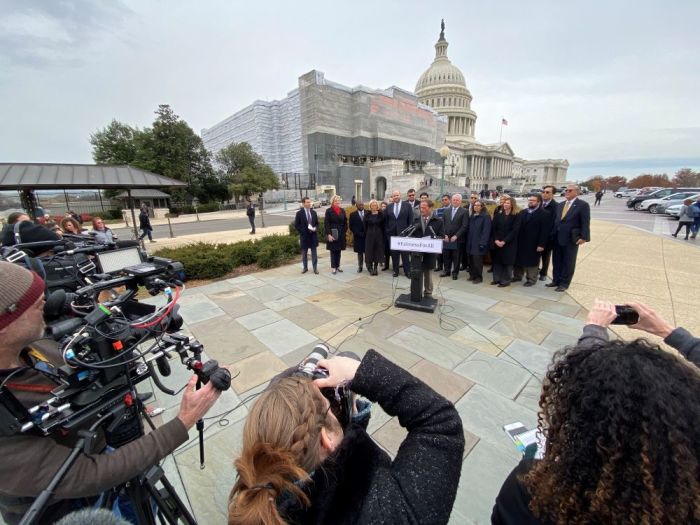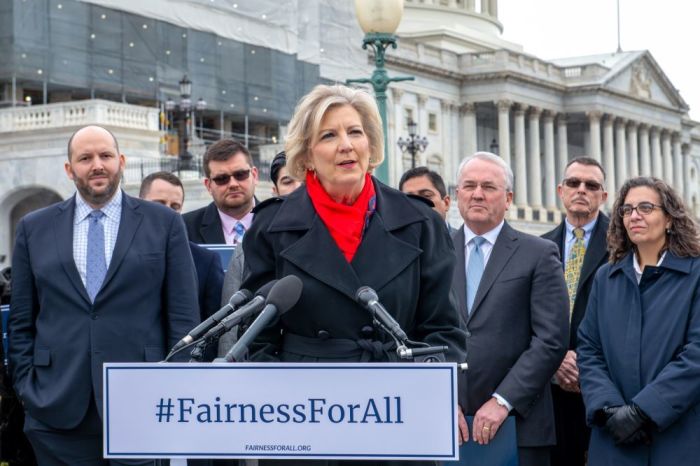Christian groups back new LGBT civil rights bill that protects religious institutions
Christian conservative groups call bill's religious exemptions 'narrow'

WASHINGTON — A new bill introduced in the U.S. House of Representatives Friday backed by faith groups seeks to extend federal discrimination protections for sexual orientation and gender identity while providing protections for individual and institutional religious objectors to homosexuality.
Rep. Chris Stewart, R-Utah, introduced the Fairness for All Act amending the Civil Rights Act to include discrimination protections on the basis of sexual orientation and gender identity, and includes laser-precise language protecting the convictions of religious organizations, health care providers and employers.
The bill is seen as the Republican response to the Equality Act, legislation passed by the House in May to codify sexual orientation and gender identity as protected social classes in federal law but does nothing to protect the beliefs of religious objectors.
“They are not mutually exclusive principles. There is enough space where both of those can be accommodated and that is what we tried to do here today. Neither side has to lose in order for the other side to win,” Stewart said at a press conference Friday.
“I think it is better for us in society if the courts don’t have to resolve these issues one at a time, often in conflicting findings over the course of many, many years. It leads to uncertainty and, in too many cases, strife and conflict.”
The bill is co-sponsored by a group of eight Republican lawmakers.
It is the first time that a Republican in either chamber has introduced legislation that would codify discrimination protections for the LGBT community into federal law.
Fairness for All, however, has drawn the ire of prominent conservative legal and lobbying organizations such as the Alliance Defending Freedom, the Heritage Foundation and the Family Research Council. All three organizations have voiced concerns that the bill “shares many of the dangerous characteristics of the Equality Act” in that it would “codify a radical gender ideology.”
Additionally, some LGBT activist organizations, such as the Human Rights Campaign, also oppose the legislation, saying that it provides “substandard protections for LGBTQ people” and has “massive loopholes” that upend “critical federal programs.”
As the Equality Act stands little chance of passing in the Republican-controlled Senate, proponents feel the compromise legislation has a more realistic chance of bridging the partisan divide and becoming law one day. However, they recognize it could be an uphill battle.
The Fairness for All legislation is more than three years in the making and a diverse coalition of religious and civil society organizations and activists called Alliance for Lasting Liberty came up with the framework.
Among the groups involved in the discussions for the bill are the 1st Amendment Partnership, the American Unity Fund, the Council for Christian Colleges & Universities, the Center for Public Justice and the Institutional Religious Freedom Alliance.
Proponents of the legislation believe that more support for Fairness for All could be had depending on how the U.S. Supreme Court rules on a pending Title VII cases next year.
“The Supreme Court cases are going to be decided sometime this spring. If they are found to be only for the employers, there will be a real push to press the Equality Act into law,” CCCU President Shirley Hoogstra told The Christian Post.

“The Fairness for All bill stands in readiness for the religious liberty protections that are essential to make the rights in the Equality Act even possible or palatable. This is the firetruck and the firefighters in case this one-sided only bill were to have any movement. We need to be prepared to offer a much better result because LGBT people are going to continue to press for civil rights. And religious liberty is essential in the American landscape.”
Tyler Deaton, a gay Christian and senior adviser at the American Unity Fund, said the coalition will press both chambers to have hearings on the Fairness for All Act.
Tim Schultz, the president of 1st Amendment Partnership, challenged the political system to stop posturing on the issue. He argued that the one-sided approach to LGBT protections is not working since many states lack sexual orientation and gender identity protections.
“What we have done here is drafted something that we think looks forward to what might actually eventually become law,” he said. “It really is saying, ‘Let’s see if the political system is ready to solve these issues rather than just posture on them.’ This is very much like what the solution will be like.”
White House Deputy Press Secretary Judd Deere signaled an openness to the legislation in a statement to The Washington Blade, an LGBT publication, on Friday.
“The White House looks forward to reviewing the legislation,” Deere said.
The legislation is also supported by the AND Campaign, a progressive Christian civic engagement organization that upholds a traditional Christian ethic on sexuality. It is also backed by the Seventh-day Adventist Church and the Church of Jesus Christ of Latter-day Saints, institutions that uphold traditional Christian teachings on marriage.
“We don’t see this as any sort of compromise to our principles. We feel like it aligns with who we are as Christians,” Melissa Reid, associate director of public affairs and religious liberty at the Seventh-day Adventist Church, told CP.
“We have always stood for the separation of church and state and religious freedom. That is something that has been important to us since our church’s inception. This piece of legislation really champions individual conscience. It upholds our right as a church to hold our faith tradition and our values in our own institutions, but at the same time in the public sphere allows people to follow their consciences in that way.”
Another organization that has expressed support for the idea of Fairness for All is the National Association of Evangelicals, an association of 45,000 churches and organizations from over 40 different countries.
The Fairness for All Act is similar to a bill that passed in Utah in 2015 that protects LGBT people from discrimination and shields religious institutions that uphold teachings that oppose homosexuality.
Among other things, the bill would ban discrimination against the LGBT community in situations of public accommodation, housing, employment or finances.
Under the bill, small businesses with fewer than 15 or more employees would not qualify as places of public accommodation in federal law and would not be bound by the federal discrimination statute for places of public accommodation, something LGBT activists fear could allow small businesses to discriminate against LGBT individuals.
Stanley Carlson-Thies, the founder of the Institutional Religious Freedom Alliance, told CP that there still might be some concerns for small businesses when it comes to state and local accommodation laws that have been an issue of concern for Christian businesses in the past that have refused to service same-sex weddings.
The bill also carves out what types of organizations qualify as religious employers who would be exempt from Title VII employment law allowing them to hire and fire on the basis of the organization’s convictions on sexuality and gender.
For example, a house of worship is considered a religious employer, while a religious-run hospital is not a religious employer and would not be exempt under Title VII employment laws.
“Hospitals are places of public accommodations and there are employment rights,” Carlson-Thies said. “But this bill says that a medical professional doesn’t have to do transgender surgery and that kind of thing. But there is no blanket protection for their religious hiring. That is because almost no hospital only hires religious people.”
Under the bill, hospitals and medical providers would not be required to perform gender transition procedures regardless of whether they are religious-based institutions. Additionally, healthcare providers would not be forced to perform abortions. Religious doctors would have greater leverage to receive religious accommodations from their employers, the bill's supporters say.
While faith-based foster care and adoption care providers have been penalized by state and local governments over the years and forced to shut down for refusing to place children in the homes of same-sex couples, the bill seeks to protect those institutions from federal, state and local government actions.
“One of the important areas [where this bill reaches into states] is foster care and adoption, which have been very controversial,” he said. “States get a lot of federal funding for that, so this bill says that when a state takes that federal money, then, even if they are Massachusetts, they can’t unlicense an organization because [it doesn’t serve same-sex couples.]”
He added that the Fairness for All Act protects the Religious Freedom Restoration Act while the Equality Act seeks to dismantle the 1993 law.
Additionally, religious colleges and universities would be protected from state laws that interfere with their employment policies and from hostile accreditation agencies, according to CCCU’s Hoogstra.
Chris Butler, the lead pastor of Chicago Embassy Church and executive committee member of the AND Campaign, said during Friday’s press conference that it's the “responsibility” of the church to “step forward into polarized environments and become the agent of reconciliation.”
“The Christian values of love and compassion don’t always demand agreement but they often demand social action,” he said. “Saying that we love our neighbors from a pulpit cannot be only empty words. We have to advocate for policy that protect our LGBTQ neighbors while maintaining and never surrendering but always guarding our own Christian convictions.”
Leaders from social conservative organizations such as FRC, Heritage Foundation, Concerned Women for America, Christian Medical and Dental Association and the American College of Pediatricians objected to Fairness for All in a letter to members of Congress last month.
“FFA is simply not an effective means of stopping the Equality Act. Its narrow religious exemptions would not even protect religious schools, colleges and charities that open their property to the public, but who don’t want it used to celebrate same-sex weddings,” the letter reads.
The organizations contend that adding sexual orientation and gender identity to federal law “could force employers to permit transgender employees to use the private facilities of the opposite sex and violate sex-specific dress codes.”
“It could create a ‘preferred pronoun’ mandate and require employers to include sex-reassignment treatments in their employee health plans,” the organizations fear. “Under FFA, only businesses with less than 15 employees are exempted, while the rest face the certain loss of their conscience rights as their workforces grow. FFA would also lessen the impact of the Department of Labor’s recent proposed rule allowing religious federal contractors to hire according to their own religious beliefs and practices.”
The letter adds that prominent LGBT rights groups oppose religious exemptions and have successfully gotten them repealed in other countries.
“Indeed, the severability language in FFA could allow the religious exemptions it contains to be invalidated while other damaging provisions remain,” they argue.
FRC President Tony Perkins, a major conservative evangelical activist in Washington, said in a statement Friday that Fairness for All sacrifices the conscience rights of Americans to "secure a few minor carveouts."
"'Fairness for All' represents a near-total surrender to the aggressive LGBT agenda," he argued. "It would legitimize discrimination against people of faith like floral artist Barronelle Stutzman, who was targeted by the government because she operated her business according to her Christian beliefs. Religious liberty includes the freedom to practice one's faith in every area of life, not just within a religious institution or the four walls of one's church."
Follow Samuel Smith on Twitter: @IamSamSmith
or Facebook: SamuelSmithCP





























